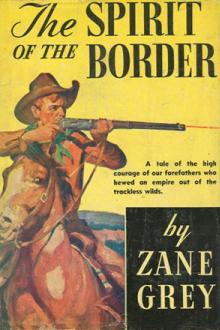The U. P. Trail, Zane Grey [robert munsch read aloud .txt] 📗

- Author: Zane Grey
Book online «The U. P. Trail, Zane Grey [robert munsch read aloud .txt] 📗». Author Zane Grey
It was a time for quick judgment. The scout said they could not ride down over the ridge, and the chief decided they must follow along it. The going got to be hard and rough. One by one the men dismounted to lead their horses. Neale, who rode a mettlesome bay, could scarcely keep up.
“Take mine,” called Larry King, as he turned to Neale.
“Red, I’ll handle this stupid beast or—”
“Wal, you ain’t handlin’ him,” interrupted King. “Hosses is my job, you know.”
Red took the bridle from Neale and in one moment the balky horse recognized a master arm.
“By Heaven! we’ve got to hurry!” called Neale.
It did seem that the Indians would head them off. Neale and King labored over the rocky ground as best they could, and by dint of hard effort came up with their party. The Indians were quartering the other ridge, riding as if on level ground. The going grew rougher. Baxter’s horse slipped and lamed his right fore leg. Henney’s saddle turned, and more valuable time was lost. All the men drew their rifles. At every dip of ground they expected to come to a break that would make a stand inevitable.
From one point on the ridge they had a good view of the troops.
“Signal!” ordered the chief.
They yelled and shot and waved hats and scarfs. No use—the soldiers kept moving on at a snail pace far below.
“On—down the ridge!” was the order.
“Wal, General, thet looks bad to me,” objected the scout. Red King shoved his lean, brown hand between them. There was a flame in his flashing, blue glance as it swept the slowly descending ridge.
“Judgin’ the lay of land is my job,” he said, in his cool way. “We’ll git down heah or not at all.”
Neale was sore, lame, and angry as well. He kept gazing across at the Sioux. “Let’s stop—and fight,” he panted. “We can—whip—that bunch.”
“We may have to fight, but not yet,” replied the chief. “Come on.”
They scrambled on over rocky places, up and down steep banks. Here and there were stretches where it was possible to ride, and over these they made better time. The Indians fell out of sight under the side of the ridge, and this fact was disquieting, for no one could tell how soon they would show up again or in what quarter. This spurred the men to sterner efforts.
Meanwhile the sun was setting and the predicament of the engineers grew more serious. A shout from Neale, who held up the rear, warned all that the Indians had scaled the ridge behind them and now were in straightaway pursuit. Thereupon General Lodge ordered his men to face about with rifles ready. This move checked the Sioux. They halted out of range.
“They’re waitin’ fer dark to set in,” said the scout.
“Come on! We’ll get away yet,” said the chief, grimly. They went on, and darkness began to fall about them. This increased both the difficulty and the danger. On the other hand, it enabled them to try and signal the troops with fire. One of them would hurry ahead and build a fire while the others held back to check the Indians if they appeared. And at length their signals were answered by the troops. Thus encouraged, the little band of desperate men plunged on down the slope. And just when night set in black—the fateful hour that would have precipitated the Indian attack—the troops met the engineers on the slope. The Indians faded away into the gloom without firing a shot. There was a general rejoicing. Neale, however, complained that he would rather have fought them.
“Wal, I shore was achin’ fer trouble,” drawled his faithful ally, King.
The flagman, Casey, removed his black pipe to remark, “All thet cloimb without a foight.”
General Lodge’s first word to Colonel Dillon was evidently inspired by Casey’s remark.
“Colonel, did you have steep work getting up to us?”
“Yes, indeed, straight up out of the valley,” was the rejoinder.
But General Lodge did not go back to camp by this short cut down the valley. He kept along the ridge, and it led for miles slowly down to the plain. There in the starlight he faced his assistants with singular fire and earnestness.
“Men, we’ve had a bad scare and a hard jaunt, but we’ve found our pass over the Wyoming hills. To-morrow we’ll run a line up that long ridge. We’ll name it Sherman Pass.... Thanks to those red devils!”
On the following morning Neale was awakened from a heavy, dreamless sleep by a hard dig in the ribs.
“Neale—air you daid?” Larry was saying. “Wake up! An’ listen to thet.”
Neale heard the clear, ringing notes of a bugle-call. He rolled out of his blankets. “What’s up, Red?” he cried, reaching for his boots.
“Wal, I reckon them Injuns,” drawled Red.
It was just daylight. They found the camp astir—troopers running for horses, saddles, guns.
“Red, you get our horses and I’ll see what’s up,” cried Neale.
The cowboy strode off, hitching at his belt. Neale ran forward into camp. He encountered Lieutenant Leslie, whom he knew well, and who told him a scout had come in with news of a threatened raid; Colonel Dillon had ordered out a detachment of troopers.
“I’m going,” shouted Neale. “Where’s that scout?”
Neale soon descried a buckskin-clad figure, and he made toward it. The man, evidently a trapper or hunter, carried a long, brown rifle, and he had a powder-horn and bullet-pouch slung over his shoulder. There was a knife in his belt. Neale went directly up to the man.
“My name’s Neale,” he said. “Can I be of any help?”
He encountered a pair of penetrating gray eyes.
“My name’s Slingerland,” replied the other, as he offered his hand. “Are you an officer?”
“No. I’m a surveyor. But I can ride and shoot. I’ve a cowboy with me—a Texan. He’ll go. What’s happened?”
“Wal, I ain’t sure yet. But I fear the wust. I got wind of some Sioux thet was trailin’ some prairie-schooners up in the hills. I warned the boss—told him to break camp an’ run. Then I come fer the troops. But the troops had changed camp an’ I jest found them. Reckon we’ll be too late.”
“Was it a caravan?” inquired Neale, intensely interested.
“Six wagons. Only a few men. Two wimmen. An’ one girl.”





Comments (0)